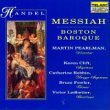ACCOMPAGNATO (ACCOMPANIED RECITATIVE) (TENOR)Comfort ye, my people, saith your God. Speak ye comfortably to Jerusalem, and Gently pulsating E-Major chords in the strings5 contrast greatly with the conclusion of the Overture. Like a heart beat, they calm and soothe. Handel marked the short introduction Larghetto e piano. The effect is one of great intimacy. The contrast between this moment and the tense, driven Overture is vivid and moving. The tenor enters without accompaniment: “Comfort ye.” Then, in one of the most beatific moments in music, over the pulsing full string ensemble, the tenor soloist sings a graciously descending phrase that offers a message of comfort to God’s distressed and war-torn people. [Excerpt 3] Each statement of the “Comfort ye” passage changes slightly, but always moves downward in a pacifying gesture. By contrast, with each statement of “Saith your God”, the melody rises upward to a point of rest (a seeming tonic pitch), strong and confident. The next phrase is longer and amplifies the gesture of the comfort message. At the words “and cry...”, the tenor is again unaccompanied, and the melody leaps a full octave upward, a voice raised to be heard by Jerusalem: her warring is over. The first statement of “her iniquity” is sung to an upward leap of an augmented fourth, a tritone, from medieval times called the “devil in music”; the answering “...is pardoned” settles on a consonant major chord with a palpable release of tension. [Excerpt 4] Following this lyrical opening, the tenor issues a bold proclamation with an attention-getting fanfare. The accompaniment is reduced to simple chords in the solo string group, so the tenor is a lone voice, a prophet “crying in the wilderness”: “Prepare the way of the Lord.....” [Excerpt 5] Handel’s use of the tenor at this moment is also reminiscent of the Evangelist’s role in Bach’s settings of the Passion story from the gospels of Matthew and John; he is a kind of master of ceremonies, directing our attention to the prophecy in the following aria. AIR (TENOR)Ev’ry valley shall be exalted, and ev’ry mountain and hill made low, Word painting is particularly important in this aria. It helps us imagine the radical changes which will make possible a road to God. Handel paints the word “exalted” with a melody figure in a rising sequence. (I am put in mind of a pneumatic jack of some sort, driven by the air of the singer’s voice.) He repeats this device several times through the aria. “Mountains” are on higher pitches than “hills”, and the word “low” is indeed at the low pitch in the phrase. “Crooked” is realized first by quickly alternating pitches and later by a wide-ranging melody with big leaps, suggesting a path over incredibly rough terrain. This jaggedness is “made plain” by interrupting the “crooked” figure with long notes on one pitch, then descending gradually by scale steps. [Excerpt 6]
PAGE 1 2 3 4 5 6 7 8 9 10 11 12 13 5 The score specifies senza ripieno (without the full ensemble–i.e., using only a soloist from each string section); the full ensemble enters in measure five. Handel used contrasting string densities throughout the oratorio. Typically the soloists performed the introductions to airs and choruses and sometimes soft interludes between vocal phrases, and often accompanied lyrical or intricate vocal lines. The full ensemble provided forceful statements where Handel needed them. |

